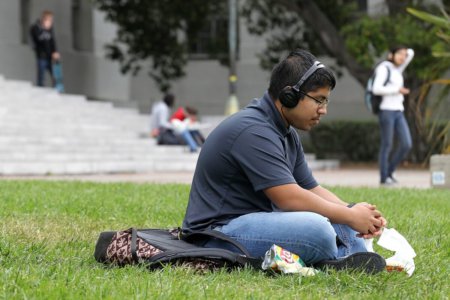
When you’re far away from home, it’s easy to neglect self-care.
Close to half (48%) of college students experienced moderate to severe psychological stress and 53% were lonely, according to a study by the American College Health Association.
And that’s just students who are just in another city. International students, many of whom are several time zones away, grapple with higher levels of anxiety compared to their local peers.
Who could blame you? It’s hard to catch a break when you’re in an unfamiliar environment in a different city or country — more so if it’s your first time.
With so many things to do and new things to get used to, you just can’t find the time to fit self-care tips into your life.
Culture shock is usually the key stressor. You’re surrounded by strangers from different cultures and backgrounds – maybe they don’t speak the same languages or have the same interests and hobbies as you. No matter how eager you were to explore a new country away from home, you’ll likely still feel homesick.
Then, there are financial and academic pressures. Most of your time is dedicated to classes and assignments, and whatever spare time you have for yourself is dedicated to other commitments like part-time jobs, curricular activities, or doom-scrolling social media in bed. You fall into the slump of thinking you’re not enjoying your time abroad, which might cause you to spiral further.
Hear it from us – it will get easier.
You’ll make friends, explore and discover new places and things to do, and enjoy food you’ve never tried before. Don’t be afraid to reach out to others, and keep yourself healthy – poor eating habits and sleep deprivation are some of the biggest stress triggers.
Most importantly, it’s okay to practise a little self-care. Set up a self-care routine for yourself, and find out what makes you relaxed and happy to prevent burnout. It’ll help you adapt to changes, recover from setbacks, and face challenges with a clearer, healthier mind.
Let’s explore some self-care tips and routines for international students living away from home.

During tough times, it’s okay to rely on others for a little help, especially when you’re studying abroad. Source: AFP
How to practise self-care abroad
Most self-care tips are pretty common – eating well, drinking water, getting enough sleep, and exercising are just a few examples. Most of us know these are important, but still struggle turning them into practice.
Other self-care routines and tips have blended together over the last few years, especially during the pandemic when everyone was locked in. It’s usually bubble baths, online shopping – #TreatYourself – or laying in bed all day rewatching “Bridgerton” on Netflix. Of course, if these work for you and make you happy, then go right ahead!
In reality, we need self-care to keep us motivated and feeling good. Everyone’s needs are different, so it’s important to figure out what methods work best for you and your well-being.
For international students, here are our best self-care tips that go beyond just scented candles and meditation.

Most students dread laundry day. Are you one of them? Source: AFP
Best self-care tips when you’re far away from home
Create a to-do list and take something off
We get it. There’s a lot to be done every day. Laundry, dishes, cooking, vacuuming and groceries — these are just part of a seemingly neverending list, and the more you procrastinate or put them off, the more it’ll affect your day-to-day life.
Creating a to-do list will help you visualise what you need to get done, and you can even prioritise the more important ones.
Change your bedsheet to feel refreshed, or clean out old food and groceries. You may feel like you don’t have 10 minutes but trust us, everyone has 10 minutes to spare.
You’ll feel a sense of accomplishment, and keep your living space tidy too.
Tick one or two items off a day – you don’t have to do everything at once. Your mom may have told you to fold the laundry immediately after removing it from the dryer, but you don’t have to.
But at the same time, try to avoid leaving your laundry on a chair or at the end of your bed for days on end.
Turn off notifications and disconnect
In this day and age, the Internet has us all in a grip – it’s hard to find someone who isn’t scrolling social media, watching reels or TikTok, or engaged in a conversation online.
It’s a good idea to take a digital detox on days that you can afford to do so. When class isn’t too hectic, turn off notifications and close your social media applications. While scrolling social media is a joy on its own, there are also moments when online content can negatively impact your mental well-being, and that’s when it’s crucial to disengage and log off.
There have been links found between long screen time and mental health struggles. 64% of people who use social media report feeling stressed or anxious after logging off, and over 70% of young people believe that social media platforms don’t do enough to prevent cyberbullying and negativity.
When you disconnect from the online world, your overall well-being will improve. You’ll sleep better, have increased focus in classes, boost creativity and, most importantly, have more time for other self-care activities.
Some people even choose to uninstall social media apps during or close to exams as a way to free themselves from distractions completely. Fun fact, certain apps like OFFTIME and One Sec help avoid social media by displaying your screen time usage and restricting access to applications you’re easily distracted by. If you’re absolutely serious about taking accountability for your allocated detox time, Digital Detox provides challenges that will actually cost real money to quit.
Use the time you have to practise other self-care routines – take that bubble bath, do a face mask or take care of a little plant.
Although turning off notifications can be freeing, it’s a good idea to customise your settings to allow calls or messages from family or close friends to come through.
When you’re far from home, it’s always a good idea to keep in contact with your loved ones especially if an emergency arises. That way, you can filter out unnecessary pinging while ensuring your safety.

There are various games on consoles like the Nintendo Switch ranging from relaxing to fun to play with friends such as Animal Crossing, Just Dance, Overcooked and more. Source: AFP
Playing video games
Video games don’t have to be just about smashing or shooting the enemy team to pieces and requiring you to have split-second reaction times. That sounds pretty intense but then again, if games like Overwatch 2 or Valorant work as stress relievers for you, go right ahead.
There are relaxing games you can play at your own pace too. Games like Story of Seasons, Stardew Valley or Coral Island share the same theme of running your own farm, with relaxing soundtracks that change every in-game season.
Unpacking is a great zen puzzle game that’s all about taking things out of boxes while learning more about the character’s life. These games are available on PC and the Nintendo Switch, so you can play them anywhere.
Alternatively, you could watch someone play video games on platforms like YouTube and Twitch.
It’s a fun self-care idea to pass the time, and there are many video game content creators out there with great reactions. Check out:
- Markiplier, an American YouTuber known for his Let’s Plays and fondness for indie horror games.
- Jacksepticeye, an Irish YouTuber centered around gaming and vlogs.
- Valkyrae, an American content creator who won YouTube’s Top Gaming Creator of the Year in 2020.
- Tuonto, a young gamer who is both a YouTube and Tiktok star famous for his playthroughs of games like Minecraft, Honkai: Star Rail, Genshin Impact and Valorant.
Set boundaries
Learning to say no is such a simple concept, yet one that many find hard to do.
When you feel overwhelmed with academic, social and/or work commitments, it’s a good idea to set boundaries for yourself. Only say yes to activities that are important to you, and say no to the ones that aren’t.
For example, it’s okay to see and talk to your friends twice a week instead of daily. It’s alright to excuse yourself from a gathering if money is tight and you’d rather stay at home and cook something simple.
When others come to you looking to vent about personal issues, it’s alright to tell them that you’re not ready to hear it – and don’t feel guilty. Carrying your own responsibilities is hard enough, and while it’s good to be there for a friend when they need it, it shouldn’t overwhelm you either.
Learn some phrases on how to say no:
- I appreciate the offer, but I can’t.
- I have other commitments at the moment, but thank you for thinking of me.
- Could you keep me in mind for next time?
- I don’t think I’m the right person for that, but I’m flattered that you thought of me.
- How about you try it on your own first, and then I can help you?
Remember that while you may not be obliged to state your exact reasoning, it’s still a good idea to briefly touch upon it if you can – a lack of communication may lead to misunderstandings and tension between you and those around you.

As an international student, it’s important to stay connected to your family back home. Set aside time to video call them a couple of times a week to catch up and talk. Source: AFP
Schedule a downtime to recharge do nothing
It can be hard to catch a break during university, especially when faced with deadlines and upcoming exams. We tend to avoid activities that may distract them, such as social media or watching shows, in fear that we may forget what we studied.
While it’s true that you shouldn’t be binge-watching shows during crunch time, scheduling some time for yourself can help you feel more relaxed. Read a book, listen to a podcast, cook a dish, draw or just do nothing for an hour or two. It’ll make you happier and help take your mind off stressful things.

It’s just a woman whispering into a microphone – and yet, millions of people are mesmerised by it. Source: AFP
Strange but just as effective self-care tips
These tips may not work for you, but you can try them out for sure!
Watch ASMR videos
ASMR (autonomous sensory meridian response) was a relatively new concept a couple of years ago but has taken the Internet by storm since. ASMR aims to relax the viewer, stimulating a euphoric calming sensation in the back of the head and down the spine.
It sounds wacky, but it works. There are communities dedicated to creating ASMR content on YouTube and TikTok, ranging from card shuffling, soap cutting, slime squishing, or even applying and destroying makeup. Even celebrities like Cardi B rely on ASMR daily to go to sleep.
A study found that those who watched ASMR videos had significantly lower heart rates than those who did not. The effect is similar to the positive physiological changes that occur during meditation, so if meditating in silence is not for you, consider picking up ASMR to relax.
Daily affirmations and gratitude
Self-care affirmations can help shift your mindset into a positive one when you’re feeling down. It’s not just staring into a mirror and repeating the same phrases over and over again; it’s about focusing on the meaning behind them.
For example, if you’re working on prioritising yourself, say something like, “I’m setting boundaries for myself”. Use positive language to emphasise what you desire, instead of complaining about something you don’t want – say, “I’m going to lose weight”, rather than “I wish I weren’t so fat”.
When you use self-care affirmations, you acknowledge your feelings and show yourself a little more love. This boosts your confidence and helps to empower your daily life. Try it out; you never know!
Write letters to your past or future self
It’s like writing a diary, but better. It can help reflect on things you’ve done or want to do, heal from past wounds and provide insight into how much you’ve grown.
When writing to your past self, you can look back on the things you’ve experienced as a child. You remember what you aspired to do, and reminisce over past choices and mistakes.
Write down things you would have told your past self, or wish someone would have told you back then. Realising how far you’ve come since then can be a great healing process, and one that does wonders for self-care.
If you choose to write letters to your future self, they can be a powerful reminder of your identity, values and aspirations. Write it to yourself in six months, a year, or even 10 years – a lot would have changed by then. Maybe there were goals you had but forgot about, accomplishments you were aiming for, or changes you wanted to make.
The beauty of the future is in its uncertainty, after all, and when you reread the letter in the future, your past self will remind you of what matters most.









